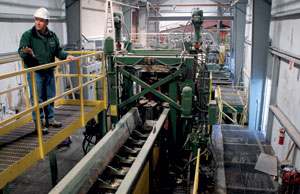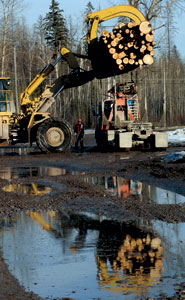COLUMBIA FALLS – In this valley of change, with a new generation of land-use laws emerging and a population growing distant from the area’s timber tradition, the F.H. Stoltze Land and Lumber Company looks to the future through the eyes of a new manager.
Chuck Roady, who replaced retired Ron Buentemeier as general manager at the beginning of this year, takes over at a delicate and difficult time for Stoltze, the second largest private landowner in Northwest Montana. The timber industry is struggling. Lumber market prices are at a 30-year low, prompting Roady to proclaim: “There’s no log anywhere you can make money off even if they gave it to you.” A population boom is bringing in newcomers unfamiliar with the give-and-take relationship between the public and logging community.
Throw in a series of regulatory laws and policies, and you have the modern Stoltze dilemma.
“It’s really, really tough,” said Paul McKenzie, Stoltze’s lands and resource manager. “It’s hard to convey how tough it is right now.”
 |
|
Chuck Roady, general manager of F.H. Stoltze Land and Lumber Company, explains how logs are scanned and profiled to determine if they are worthy of lumber. |
Stoltze Land and Lumber, Montana’s oldest family-owned lumber company located outside of Columbia Falls, owns almost 38,000 acres. Roady is in his second month at the helm of the big lumber company. There’s a lot on his plate.
In the past year alone, both Flathead County and the city of Whitefish adopted growth policies. Recently, Whitefish approved a critical areas ordinance, a controversial storm water management law, and the county board of health is working on an air quality law that could limit Stoltze’s activities because of dust concerns. The list goes on.
“(Local governments) can make something cart blanche and have no idea how it affects us,” Roady said. “If we didn’t catch it, it would cost us a fortune. (Land) can be devalued in a heartbeat.”
Or as McKenzie said: “The trees are the easy part. It’s the people that’s the challenge.”
Buentemeier, who still attends city meetings for Stoltze, is particularly concerned about the critical areas ordinance. He fears for the future of Stoltze’s 1,620 acres located within Whitefish’s planning jurisdiction. Under a 2005 agreement between the city and county, Whitefish was given planning jurisdiction over a roughly two-mile area outside of city limits.
“All of the new rules that are coming into effect are affecting the ability of large landowners to manage their lands,” Buentemeier said.
Managing development is the central issue with many of the new regulations. And while Roady points out that “we’re not growing houses, we’re growing trees,” Buentemeier said in the future Stoltze will have no other choice than to begin developing its lands. That’s where the critical areas ordinance comes in to play, he said, because of its restrictions on development.
“Let’s face it, some day there’s going to have to be homes on those lands,” Buentemeier said. “Once the community moves in around that forest land or ranch, pretty soon it will be impossible to do forest management or ranching.”
Nick Palmer, a Whitefish city councilor, said the city tried to make sure the ordinance doesn’t hinder Stoltze’s operations. He said he has the utmost respect for Buentemeier and his “wealth of historical knowledge” and “understanding of the forest,” though he disagrees with Buentemeier’s interpretation of the ordinance’s restrictions.
“I have a lot of admiration for the way Stoltze manages their land and the way they conduct their business and their contributions to the community,” Palmer said. “But I don’t know where the ordinance conflicts with (Buentemeier) anymore. All in all I think it’s fair to everyone.”
McKenzie says that if relying solely on lumber becomes “no longer an option, whether it’s because of regulations or the market, you have to have other options.” Real estate is certainly an option for a large landowner like Stoltze, as the Plum Creek Timber Company has proven with its emergence as a prominent real estate company. Stoltze hasn’t increased its real estate activity in recent years, McKenzie said, but that could change, especially as development becomes more profitable than forest management, as Buentemeier predicts.
 |
|
A Caterpillar 988 removes a load of logs from a truck at F.H. Stoltze Land and Lumber Company. The logs will be measured by hand and sorted by size and species before they are made into lumber. |
“Some people are willing to pay, what seems to us, like incredible, obscene amounts of money,” McKenzie said.
Roady, McKenzie and Buentemeier take turns attending meetings, trying to make sure nothing that could affect Stoltze’s operations gets passed unnoticed. Last week, McKenzie and Roady attended a county board of health meeting to state their case regarding a proposed air pollution control law. Their concern is that restrictions on dust could harm their ability to build, maintain and drive trucks on their roads. Following the meeting, McKenzie said he feels the board is now adequately addressing Stoltze’s concerns.
Flathead County Health Officer Joe Russell said he has always been impressed with Stoltze’s strict adherence to regulations. Equally impressive, he said, is how Stoltze representatives come to meetings with a proposed solution, instead of merely a complaint.
“They’ve been very good to work with,” Russell said. “They don’t whine about things. They ask good questions. They’ve always been very professional folks.”
Coming from the logging community of Bonner’s Ferry, Idaho, Roady has been around the timber industry his whole life and laments how differently the industry is viewed now. Both he and Buentemeier both point to the same example: people complaining about early morning noise from Stoltze trucks, a common occurrence that used to be unheard of, they said. Buentemeier said he’s been threatened with lawsuits. But the trucks must go on.
“Your first instinct is to fire right back, but that doesn’t get you anywhere,” Roady said. “It’s hard to deal with that and keep your sanity, your composure.”
Stoltze has about 137 employees, Roady said. Despite not having broken even “for a long time,” McKenzie said Stoltze has no plans to make labor cuts. The family-owned company, which has been in its current location since 1923, is proud of its fierce loyalty to employees. The workers return the loyalty. So Roady and McKenzie will continue to attend meetings, manage the mill and hope for the market to get better. Buentemeier will try to enjoy retirement.
Despite the struggles, McKenzie points out that the company has survived for nearly a century.
“You have to understand this company has been through three of these 30-year lows,” McKenzie said. “Our goal is to still go the way we have for 90 years.”